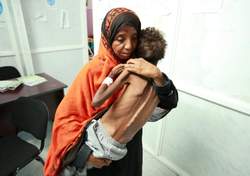 Iranian Foreign Minister’s Senior Aide for Special Political Affairs Ali Asqar Khaji called upon the international community to pose pressure on Riyadh which is evading its responsibilities under the agreement signed in the Swedish capital city of Stockholm.
Iranian Foreign Minister’s Senior Aide for Special Political Affairs Ali Asqar Khaji called upon the international community to pose pressure on Riyadh which is evading its responsibilities under the agreement signed in the Swedish capital city of Stockholm. RNA - During Sunday meeting with Mohammad Abdul Salam, the Spokesman for Yemen’s Ansarullah Movement, who is on an official visit to Iran, Khaji thanked the Yemeni movement for its unilateral commitment to international agreements on bringing an end to the Yemeni conflict, calling on the world to pressure Saudi Arabia to respect its words.
The Iranian diplomat urged the world countries to put more pressure on Saudi Arabia, that is leading a military coalition in the war on Yemen, to live up to its commitments in the document.
Ali Asqar Khaji, the Iranian foreign minister’s senior aide for special political affairs, expressed his gratitude to Yemen’s Ansarullah Movement for staying committed to Stockholm talks unilaterally.
The Iranian diplomat mentioned that Iran has always opted for political resolution of the war in Yemen, supporting the Stockholm agreements.
The Ansarullah Movement, led by Abdul Salam in Sweden talks, reached an agreement with the other Yemeni side in the Swedish capital Stockholm in 2018.
The deal is made up of four key elements: a prisoner swap, the creation of a demilitarized zone around the country’s vital Red Sea trade corridor through a series of withdrawals by rival Yemeni forces, the formation of a committee to discuss the future of the contested city of Taiz, and a commitment for the Houthis and the government to reconvene at the end of December that year.
“The Islamic Republic of Iran will keep making efforts to remove the blockade imposed on Yemen to send humanitarian aid to the country,” reiterated Khaji.
Abdul Salam also expressed the Yemeni nation’s gratitude for supporting the country in the Saudi-led war, explaining how the Stockholm Agreement is being implemented and how the future political situation will unfold.
Saudi Arabia has been striking Yemen since March 2015 to restore power to fugitive president Mansour Hadi, a close ally of Riyadh. The Saudi-led aggression has so far killed more than 20,000 Yemenis, including hundreds of women and children. Despite Riyadh's claims that it is bombing the positions of the Ansarullah fighters, Saudi bombers are flattening residential areas and civilian infrastructures.
Yemen is the world’s largest humanitarian crisis with more than 22 million people in need and is seeing a spike in needs, fueled by ongoing conflict, a collapsing economy and diminished social services and livelihoods. The blockade on Yemen has smothered humanitarian deliveries of food and medicine to the import-dependent state.
The UN has repeatedly criticized the Saudi-UAE-led military coalition's bombing campaign and placed it on a blacklist of child rights violators last year.
A UN panel has also compiled a detailed report of civilian casualties caused by the Saudi military and its allies during their war against Yemen, saying the Riyadh-led coalition has used precision-guided munitions in its raids on civilian targets.
847/940